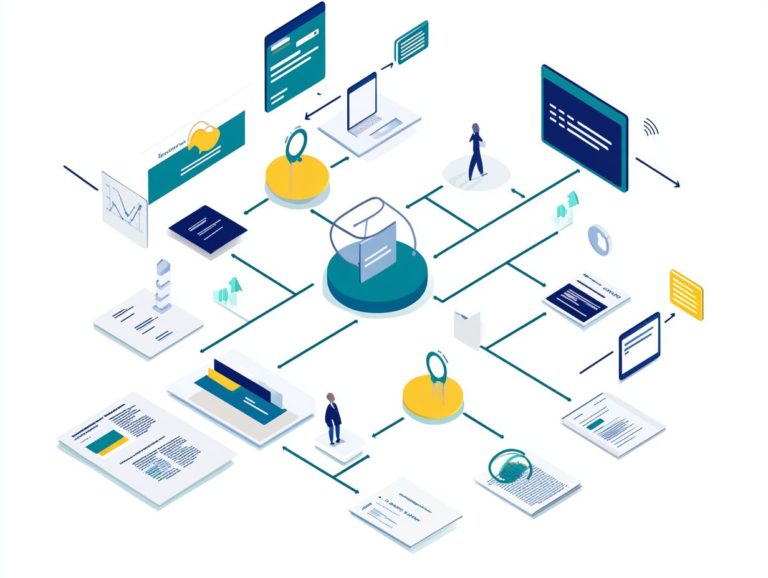What is Sales Automation in CRM Software?
Sales automation in CRM software is changing how you manage your sales.
By streamlining tasks and enhancing efficiency, sales automation boosts your productivity while optimizing lead management and reporting. This article delves into the benefits of sales automation, highlights its essential features, and provides practical tips for effective implementation.
You ll also find clarity on common misconceptions surrounding this tool, ensuring you grasp how it can elevate your sales efforts. Jump in to discover how sales automation can transform your approach and drive your success.
Contents
- Key Takeaways:
- Benefits of Sales Automation
- Features of Sales Automation in CRM Software
- Implementing Sales Automation in CRM Software
- Common Misconceptions about Sales Automation
- Frequently Asked Questions
- What is Sales Automation in CRM Software?
- How does Sales Automation work in CRM Software?
- What are the benefits of using Sales Automation in CRM Software?
- Which tasks can be automated with Sales Automation in CRM Software?
- Can Sales Automation in CRM Software be customized?
- Is Sales Automation in CRM Software suitable for all types of businesses?
Key Takeaways:

- Sales automation in CRM software streamlines sales processes, improving efficiency and productivity.
- Key features include lead management, task automation, and reporting and analytics.
- Implementing sales automation requires following best practices and addressing common misconceptions.
Defining Sales Automation and CRM
Sales automation helps you manage customer data and improve relationships using technology effectively.
By integrating sales automation with a powerful Customer Relationship Management system like Salesforce or Salesmate, you can manage your sales pipeline and optimize lead generation.
Industry thought leaders such as Paul Bookstaber and Renee Duncan underscore the pivotal role of adopting sales automation tools, emphasizing the significant time savings and enhanced sales performance you can achieve.
This integration tracks customer interactions and provides valuable insights that shape your future strategies.
For example, HubSpot’s tools help track leads effectively, making it easier to follow up, while Zoho CRM equips you with features that allow your sales team to monitor opportunity management and set precise sales goals. Automated reminders and follow-up emails ensure that no lead slips through the cracks, boosting productivity.
By analyzing customer data trends, these tools empower you to tailor your pitches with finesse, ultimately driving better customer engagement and retention.
Benefits of Sales Automation
The benefits of sales automation are numerous, greatly enhancing your sales team’s productivity while offering valuable insights into customer interactions and sales metrics.
By automating manual tasks and streamlining the sales process, your organization can enjoy significant time savings, empowering your sales professionals to concentrate on strategic initiatives that drive customer retention and elevate their sales targets.
Streamlining Sales Processes
Streamlining your sales processes through automation is essential for enhancing both efficiency and performance metrics.
By leveraging advanced CRM software and workflow automation tools, you can eliminate redundant manual tasks. This allows your sales team to devote more time to engaging with leads and converting opportunities into actual sales.
Implementing automated emails helps nurture relationships by delivering timely follow-ups and personalized content without adding to your workload.
Additionally, data visualization tools offer clear insights into performance metrics and trends, empowering you to make informed decisions and tailor your outreach effectively.
With effective task distribution systems in place, responsibilities can be allocated based on individual skill sets, maximizing your team’s productivity.
As sales engagement grows increasingly critical in navigating complex deals, these refined processes not only save time but also optimize deal management, enabling your team to focus on what truly matters closing those sales.
Explore how sales automation can boost your success today!
Improving Efficiency and Productivity
Improving the efficiency and productivity of your sales team hinges on the effective use of sales automation tools. These tools provide real-time data for decision-making and lead scoring, allowing you to prioritize your efforts on high-quality sales leads.
By automating routine tasks like follow-ups and meeting scheduling, sales automation liberates precious time for your team to focus on building relationships and closing deals. Effective contact management systems further streamline the organization of customer information, ensuring that no lead slips through the cracks.
Generative AI introduces an additional layer of sophistication, empowering your sales team to refine strategies by analyzing past interactions and predicting future customer behavior. This improves your metrics and helps you tailor your pitches, ultimately resulting in higher conversion rates and more satisfied clients.
Features of Sales Automation in CRM Software

The features of sales automation within CRM software empower you and your sales team, enhancing lead management, automating tasks, and offering in-depth reporting and analytics that support decisions based on data.
By integrating tools that deliver real-time insights and streamline customer interactions, you will achieve your sales goals with confidence!
Lead Management
Effective lead management is the bedrock of sales automation, allowing you to capture, track, and convert potential sales leads into loyal customers. By harnessing advanced data analysis and customer insights, you can prioritize leads based on their likelihood to convert, ensuring that you focus your efforts where they will yield the best results.
This process often kicks off with lead scoring, where you evaluate each lead and assign a score based on predefined criteria such as engagement levels and demographic factors. Once that is in place, nurturing becomes essential; it s all about developing relationships through targeted content and communication, guiding leads smoothly down the sales funnel.
Integrating automation tools streamlines these processes, empowering you to manage and analyze leads with remarkable efficiency. These tools save you time and offer valuable insights, enabling you to make data-driven decisions that refine your lead management strategies.
Ultimately, a well-structured lead management system establishes the foundation for sustained business growth, setting you up for long-term success.
Task Automation
Task automation is a game-changer in the realm of sales automation tools, empowering you to streamline your daily activities and elevate your sales communications.
Embrace automated workflows to lighten the load of manual tasks, allowing you to concentrate on high-value interactions that truly enhance your sales performance.
These automated processes encompass:
- Targeted email campaigns
- Timely follow-ups
- Task reminders
This effectively eliminates the risk of forgetting leads. For example, you can schedule automated emails based on customer behavior, ensuring that follow-ups hit their mark at the most opportune moments. This approach saves you precious time and maintains consistent communication, ultimately fostering stronger relationships with potential clients.
By integrating automation within your CRM system, you can effortlessly track customer interactions and outcomes, leading to more informed, data-driven decisions and increased productivity across the board.
Reporting and Analytics
Reporting and analytics are essential components of sales automation, equipping you with the tools needed to carefully track your performance through comprehensive sales reports and data visualizations. These features enable you to gain a deeper understanding of trends and patterns, which is crucial for precise sales forecasting.
With access to real-time data, you can assess your current position and adjust your strategies proactively. The customer insights derived from analytics empower you to customize your approach based on client behavior, ultimately enhancing engagement and boosting conversion rates.
By continuously monitoring sales performance, you can identify your strengths and weaknesses, reinforcing accountability within your team and ensuring that your goals are not just met but consistently surpassed.
Implementing Sales Automation in CRM Software
Implementing sales automation within your CRM software demands thoughtful planning and a commitment to best practices. This helps ensure seamless integration and optimal use of automation tools.
You must consider your organization’s unique sales processes, customer interactions, and team dynamics to effectively engage with leads and reach your sales objectives.
Best Practices and Tips

Adopting best practices is vital to maximize the advantages of sales automation within your CRM software. This helps your sales team harness technology like never before!
Fostering clear communication is also important. Implementing regular training will set the stage for sustainable sales success.
By prioritizing user-friendly interfaces, your team can navigate the software effortlessly. This reduces frustration and enhances engagement.
Collaboration plays a crucial role; integrating tools that promote seamless teamwork allows for better task distribution, enabling each member to concentrate on their strengths.
Encouraging ongoing feedback will help you adapt workflows. It is essential to periodically evaluate your automation tools to ensure they align with the evolving needs of your team. This proactive approach boosts productivity, leading to improved outcomes and a more dynamic sales culture.
Common Misconceptions about Sales Automation
Understanding common misconceptions about sales automation is essential for organizations aiming to embrace these transformative technologies. Misunderstandings can significantly impede the effective implementation of automation tools.
You might assume that sales automation merely replaces human roles; however, the reality is that it gives them the power to concentrate on what truly matters: nurturing and building customer relationships.
Addressing Concerns and Myths
Tackling concerns and myths about sales automation is crucial for cultivating a positive perception of this technology among your sales teams and stakeholders. By debunking common misconceptions, you can help everyone appreciate how sales automation genuinely enhances customer relationships and streamlines sales processes.
Many people believe that automation eliminates the need for personal interactions, but data reveals a different story: it actually gives sales professionals the power to engage in meaningful conversations and derive strategic insights. By automating routine tasks, your sales teams can leverage valuable customer insights to tailor their approaches, ultimately elevating sales performance.
Concerns surrounding the reliability of automated systems often overlook the enhanced accuracy and consistency that technology introduces to data management and reporting. Embracing these advancements enables your business to stay competitive and responsive, fostering a more effective sales environment that prioritizes both efficiency and relationship-building.
Frequently Asked Questions
What is Sales Automation in CRM Software?
Sales automation in CRM software refers to technology that helps sales teams work faster and smarter. It streamlines and automates various sales tasks.
How does Sales Automation work in CRM Software?

Sales automation in CRM software works by integrating various sales processes and tasks, such as lead generation, lead nurturing, sales forecasting, and customer management, into a single platform. This allows sales teams to manage all their tasks and data in one place, saving time and effort.
What are the benefits of using Sales Automation in CRM Software?
Sales automation offers many benefits: it boosts productivity, improves lead management, enhances customer relationships, and reduces manual errors. It also helps sales teams save time and focus on more high-value tasks.
Which tasks can be automated with Sales Automation in CRM Software?
Sales automation in CRM software automates tasks like lead ranking, email marketing, and generating quotes. It also handles data entry and task management, saving you time and effort.
Can Sales Automation in CRM Software be customized?
Yes! Most CRM software allows you to customize sales automation. This means you can shape your sales processes to meet your unique business needs.
Is Sales Automation in CRM Software suitable for all types of businesses?
Absolutely! Sales automation benefits businesses of all sizes. Small businesses can stay organized, while larger enterprises get advanced tools for managing complex sales processes.






